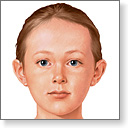| High blood pressure in children |

About 3% of children have blood pressure that is too high. The cause is often unknown. When a child's high blood pressure is severe, it is often because of another serious condition, such as kidney disease or heart disease.
Children can inherit high blood pressure from their parents. Overweight children are also at higher risk. Therefore, children who have both a family history and are overweight should be assessed carefully. The rise in the incidence of childhood high blood pressure mirrors the rise in the incidence of childhood obesity.
The American Heart Association recommends that children have their blood pressure checked once a year. More frequent follow-up would be needed if a blood pressure reading is high. Studies of children suggest that serious medical conditions, including enlarged heart and abnormalities in the kidneys and eyes, may occur even in children with mild high blood pressure. Children and adolescents with high blood pressure should be monitored and evaluated for any early organ damage.
Normal blood pressures in children
A child's blood pressure is normally much lower than an adult's. Children are at risk for developing high blood pressure if they exceed the following levels:
| Ages 3 to 5 | 116/76 |
| Ages 6 to 9 | 122/78 |
| Ages 10 to 12 | 126/82 |
| Ages 13 to 15 | 136/86 |
Treatment
Generally, if the high blood pressure is mild, the treatment may be weight loss, regular physical activity, and a low-sodium diet that includes plenty of fruits and vegetables. Sometimes medication is prescribed. With treatment, a child's blood pressure will often become normal. As with any disease, early diagnosis and treatment is best.
Reviewed By: Steven Kang, MD, Division of Cardiac Pacing and Electrophysiology, East Bay Arrhythmia, Cardiovascular Consultants Medical Group, Oakland, CA. Review provided by VeriMed Healthcare Network. Also reviewed by David Zieve, MD, MHA, Medical Director, A.D.A.M., Inc.
